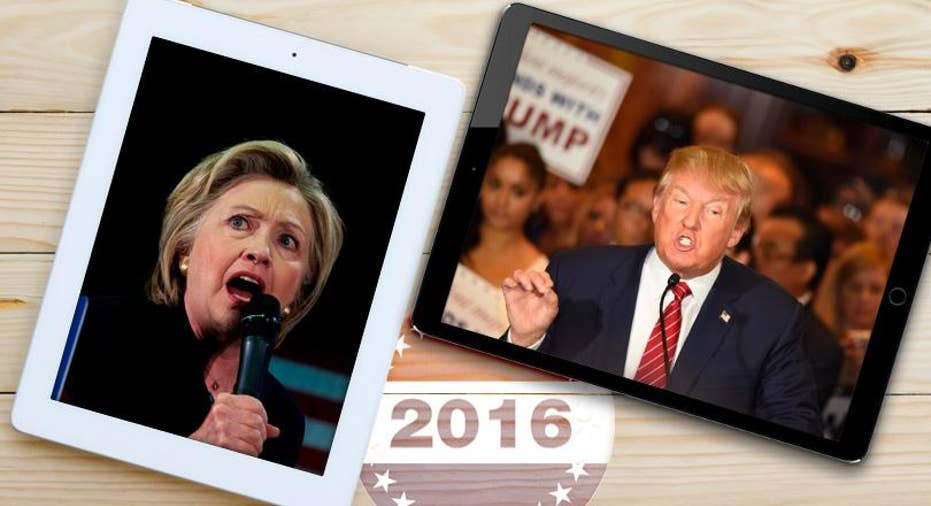Clinton vs. Trump: Where They Stand on Technology

The seemingly interminable 2016 election comes to a close tomorrow night (hopefully). And while most of us have probably made up our minds by now (right?), perhaps there are a few tech-savvy types who are on the fence between Hillary Clinton and Donald Trump. Hey, it could happen.
For the most part, Silicon Valley has given Trump a cool reception, save for Peter Thiel and maybe Palmer Luckey. The most substantive debate the two have had on a tech-related issue was September's exchange about state-sponsored cyber attacks. You can read the entire back-and-forth here, but this was when Trump suggested that the DNC hacks were perhaps carried out by "someone sitting on their bed that weighs 400 pounds" and called the Internet "the cyber," so yeah.
Clinton, meanwhile, has spent much of her campaign fielding questions about her private email server, the details of which appear to be making headlines until the very last minute.
So while it appears that neither candidate is exactly a tech genius, they do have some ideas on issues concerning the industry. Read on for a rundown of a few things on which both candidates have weighed in.
Cyber-Security
ClintonAs she outlined in an exhaustive policy paper, Clinton wants to expand on President Obama's Cybersecurity National Action Plan. She supports having a federal Chief Information Security Advisor, the modernization of federal IT systems, and upgrades to government-wide cybersecurity. That includes multi-factor authentication for federal systems, the use of tools such as government bug bounties, and a "government red teams" that will work to ID and fix bugs before hackers exploit them. Clinton "supports expanded investment in cybersecurity technologies, as well as public-private collaboration on cybersecurity innovation, responsible information sharing on cyber threats, and accelerated adoption of best practices."
Trump Trump says "improving cyber security will be an immediate and top priority for my administration." He will direct the Justice Department to "create a joint task force" with federal, state, and local law enforcement "to crush this still-developing area of crime." A "cyber-review team" will also audit existing government IT systems and establish a training program for government employees.
Visas for Skilled Workers
Clinton "Far too often, we require talented persons from other countries who are trained in US universities to return home, rather than stay in here and continue to contribute to our economy," Clinton says on her campaign website. She's in favor of giving green cards to those who earn STEM masters and PhDs from accredited institutions. She would also issue startup visas to international entrepreneurs who start businesses in the US, provided they get financial backing from US VCs and create a certain number of jobs. She has voiced concern, however, about US companies that hire foreign workers just to save money, even if a US worker is available.
Trump During a March 3 debate, Trump said "we absolutely have to be able to keep the brain power in this country," when asked about the H-1B visa program for highly skilled workers. He later said that "the H-1B program is neither high-skilled nor immigration," but instead serves to import foreign workers who can be paid less. "I remain totally committed to eliminating rampant, widespread H-1B abuse." US companies should be required "to hire American workers first for every visa and immigration program," he said.
Internet Freedom
Clinton As Secretary of State, Clinton identified Internet freedom as a major policy principle for the US. As president, "she will oppose efforts to block or degrade Internet access or to shut down social media, and she will stand with like-minded countries against efforts by countries like China or Russia to create a balkanized Internet run by governments."
Trump During a December debate, Trump said he was open to closing parts of the Internet. "I would certainly be open to closing areas where we are at war with somebody. I sure as hell don't want to let people who want to kill us and kill our nation use our Internet," Trump said. "ISIS is using the Internet better than we are using the Internet and it was our idea."
Net Neutrality
Clinton Like President Obama, Clinton has been a strong supporter of net neutrality. "The government has an obligation to protect the open Internet," she says. Clinton vows to defend the FCC's rules in court and continue to enforce them.
Trump Like many of his fellow Republicans, Trump is not a fan of the FCC's net neutrality rules. After President Obama pushed the agency to reclassify broadband as a telecom service in November 2014, Trump tweeted that the move was "another top-down power grab."
Computer Science Education
Clinton Clinton backs President Obama's push to offer more computer science classes in US schools, and wants to train an additional 50,000 computer science teachers in the next 10 years. She also supports grants that would allow for innovative approaches to STEM education, such as makerspaces, robotics competitions, and after-school programs.
Trump When asked by ScienceDebate.org how we prepare students for 21st century jobs, particularly those in STEM, Trump did not directly answer the question, instead arguing that control of schools should be at the state and federal level, not in the hands of the Education Department.
Internet Governance
Hillary ClintonClinton supports handing over control of the Web's governing body to the nonprofit Internet Corporation for Assigned Names and Numbers (ICANN). The transition, which occurred on Oct. 1, ends Commerce Department oversight that was intended to be temporary but has dragged on for years. Clinton says she views the transition "as a critical step towards safeguarding the Internet's openness for future generations."
Donald Trump"Internet freedom will be lost for good" if the transition happens, Trump argued prior to the switch. "There will be no way to make [the Internet] great again once it is lost," according to a spokesman, who pushed Congress to intervene.
This article originally appeared on PCMag.com.



















